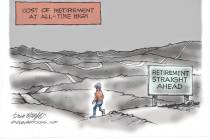EDITORIAL: No drugs or guns? You’re busted anyway
The costly, counterproductive war on drugs has turned the United States into incarceration nation. According to the International Centre for Prison Studies, 716 of every 100,000 people in this country are locked up, by far the highest rate in the world, well ahead of such beacons of freedom as Rwanda, Cuba and Russia.
Yet as more and more Americans come to realize the failures of America’s prohibitionist drug policy — this fall, for the first time, Gallup found a clear majority of people favor complete legalization of marijuana — our elected officials and police forces seem more determined than ever to lock up citizens for nonviolent offenses — or for nothing at all.
The arrest of Norman Gurley two weeks ago by the Ohio Highway Patrol perfectly illustrates the tyranny of the drug war and the threat it poses to the rights of law-abiding citizens. As reported by reason.com, Mr. Gurley was charged with having a secret compartment in his vehicle — even though the compartment was empty.
Ohio lawmakers made having a secret compartment in a vehicle a felony if — and it’s a big if — authorities suspect that compartment is used to transport drugs. The wording of the statute gives police carte blanche to search vehicles without legitimate probable cause.
Indeed, troopers claimed they searched Mr. Gurley’s car because they smelled raw marijuana, according to the Morning Journal of Loraine, Ohio. They found no drugs, but they did find a hidden compartment. That must have been some strong invisible marijuana, considering troopers smelled it from outside the car. So Mr. Gurley faces prosecution only under the secret compartment law, which could send him to prison for 18 months.
Someone might add a storage compartment to a car for any number of security reasons. Given the frequency of vehicle burglaries, a hidden space could be used to conceal anything from tools to sunglasses. Making the creation of such a space a crime is insane.
But it’s par for the course in the four-decade, $1 trillion-plus drug war, which results in more than 1.6 million arrests per year. More than half of federal inmates are imprisoned on drug convictions. Drug laws give police broad powers to seize assets from people before they’ve been convicted of a crime, then use those assets to acquire paramilitary gear to execute nighttime raids on the homes of suspected drug offenders. Time and again, across the country, police serve warrants on the wrong homes, or needlessly escalate searches to the point that innocents are killed, costing taxpayers millions of dollars more in lawsuit settlements.
Recall that earlier this year, Deming, N.M., police stopped and arrested David Eckert, then detained him and searched his anal cavity repeatedly based on nothing more than subjective officer judgments that he might have been hiding drugs. No drugs were found.
And now police can arrest you for having an empty, concealed compartment in your car? Here’s hoping civil libertarians use Mr. Gurley’s case to have the Ohio statute thrown out and perhaps create some momentum for a reboot of this country’s devastating drug policies, which have done absolutely nothing to limit supplies or use.























